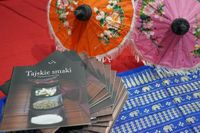In recent years, Thai cuisine has emerged as a significant player in the global food scene, earning its reputation as a form of Soft Power that boosts economic growth and cultural exchange. This is particularly evident in Poland, where the popularity of Thai food continues to rise. The Thai government has been actively promoting its culinary heritage through various initiatives, including the "Thai SELECT" certification, which ensures that Thai restaurants maintain high standards of authenticity and quality.
According to the Ministry of Commerce, the initiative aims to position Thailand as the "Kitchen of the World," leveraging the nation’s rich agricultural resources and diverse culinary traditions. With over 100 Thai restaurants operating in Poland, particularly concentrated in major cities like Warsaw, Thai cuisine has become as popular as Japanese food among locals. This growing trend is supported by a dedicated customer base familiar with Thai spices and flavors, often cultivated through their travels to Thailand.
Recently, Thai Ambassador to Poland, Ms. Orasa Mongkolnavin, along with Methinee Sirisawat, Director of the Office of Trade Promotion Affairs, visited several Thai restaurants outside Warsaw. Their visit aimed to engage with restaurant owners, both Thai and Polish, to understand the challenges they face and provide support. The ambassador emphasized the importance of authentic Thai food in promoting cultural understanding and appreciation.
As of now, 12 Thai restaurants in Poland have received the "Thai SELECT" certification, with more establishments expressing interest in applying. This certification not only assures customers of the authenticity of the food but also enhances the visibility of Thai cuisine in a foreign market.
The increasing demand for Thai ingredients in Poland post-COVID-19 has led to a significant rise in the availability of over 300 Thai food products in the market. Popular items include jasmine rice, instant noodles, curry pastes, and various snacks. The Office of Trade Promotion has noted that the Polish food and HORECA (Hotel, Restaurant, Café) industry presents a substantial opportunity for Thai food products, as interest in Asian cuisine continues to grow.
In another aspect of cultural exchange, the recent Songkran festival in Thailand saw a surge in foreign visitors, with 666,180 international tourists arriving between April 7 and April 13, 2025. This marks a 10.7% increase from the previous week, although it represents a 9.5% decrease compared to the same period last year, largely due to a decline in Chinese visitors. The number of Chinese tourists during this period was 82,274, showing an increase of 28.2% from the previous year, but still down significantly from pre-pandemic levels.
Despite the challenges, the overall number of tourists in Thailand for 2025 has reached 10,738,424, reflecting a modest 0.9% increase compared to last year. However, the Tourism Authority of Thailand has revised its projections, estimating that the total number of tourists could decrease from an initial forecast of 38.6 million to around 36 million, with a best-case scenario of not exceeding 37 million. This adjustment is attributed to concerns over safety and increased competition from other tourist destinations.
The hotel industry in Thailand has shown growth from January to March 2025, although there are concerns about profitability due to fluctuating tourist numbers. Stock prices of companies in the tourism sector, such as MINT and CENTEL, remain under pressure, with analysts suggesting that investments in these stocks may be less attractive due to high price-to-earnings ratios.
Meanwhile, a Thai student studying in Thessaloniki, Greece, organized a unique celebration of Songkran—a festival marking the Thai New Year—bringing a piece of Thai culture to Europe. From September 2023 to July 2024, the student hosted a dinner party featuring traditional Thai dishes, including pork and chicken satay, massaman curry, and larb-tod (spicy meatballs). The event attracted 20 attendees, who not only enjoyed the food but also participated in traditional water fights, a hallmark of the Songkran celebration.
This gathering served as a cultural exchange, allowing the student to share the richness of Thai cuisine and traditions with friends from various backgrounds. The student reflected on the importance of meals in fostering connections and bridging cultural gaps, emphasizing that Thai culture encompasses much more than just popular dishes like pad thai and mango sticky rice.
As the Thai government continues to promote its culinary heritage and the global community increasingly embraces Thai food, the future looks bright for Thailand's role on the international culinary stage. The combination of authentic cuisine, cultural promotion, and the growing appreciation for Thai flavors is paving the way for a more significant presence in the global food market.






